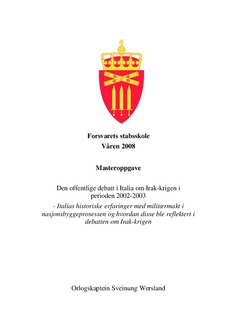Den offentlige debatt i Italia om Irak-krigen i perioden 2002-2003: Italias historiske erfaringer med militærmakt i nasjonsbyggeprosessen og hvordan disse ble reflektert i debatten om Irak-krigen.
Master thesis
Permanent lenke
http://hdl.handle.net/11250/99924Utgivelsesdato
2008Metadata
Vis full innførselSamlinger
- Masteroppgaver [466]
Sammendrag
The possibility of a war in Iraq sparked a huge debate all over the world in 2002-2003. This was also the case in Italy. What characterized the debate in Italy particularly was the way the debate made references to Italy’s own experiences in the past with the use of military force. Since the creation of the modern Italian state in 1861, Italy has on several occasions made use of military force in her quest for foreign policy achievements. In addition there has also been a strong belief that war fighting would bolster the Italians’ confidence in and identification with the Italian nation. However, on most occasions this has failed. The experiences from the Mussolini period and the Second World War lead to a distaste for war and a profound belief that war is not the way to solve international matters. Furthermore, these experiences lead Italy to repudiate war as a means modus operandi in international affairs in her new 1948 constitution as well as the experiences instigated a strong and influential peace movement. After the Second World War the Italian nation was utmost discredited and many Italians as a result found a morale reference frame in the Pope and the Catholic Church. In this thesis I argue that the debate in Italy about a possible war in Iraq during the period 2002-2003 to a large extent made explicit and implicit references to Italy’s own experiences in the past with unsuccessful use of military force. In particular, the arguments used by the peace movement and the Pope were based on a collective understanding that war and the use of military force do not solve any problems.
